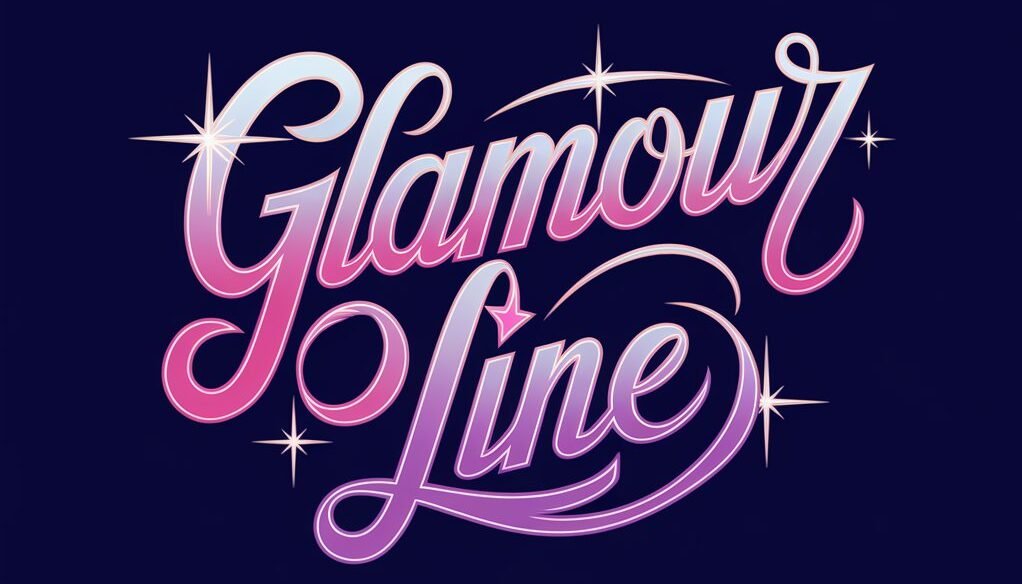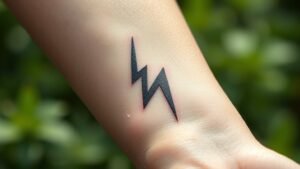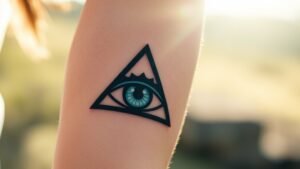When you consider an Incubus tattoo, you're tapping into a rich tapestry of meanings that intertwine desire, temptation, and psychological depth. This symbol not only reflects personal struggles with cravings and societal expectations but also opens a dialogue about power dynamics and intimacy. As you explore its historical roots and modern interpretations, you might find that your perception of self-identity shifts in unexpected ways. What makes this tattoo resonate so deeply with many? The answers might surprise you.
Historical Origins of Incubus
The concept of the incubus has deep historical roots, intertwining myth and legend across various cultures. You might find it fascinating how medieval beliefs painted these entities as malevolent spirits, haunting individuals in their sleep, leaving them both terrified and entranced.
In many cultures, variations emerged, reflecting the unique fears and desires of their societies. For instance, some saw the incubus as a seducer, while others linked it to nightmares or even fertility.
Imagine the whispers in taverns and around campfires, where stories of these nocturnal visitors fostered a sense of shared experience. These tales created a bond among people, weaving a rich tapestry of lore that still captivates imaginations today.
Understanding these origins can deepen your appreciation for the symbolism behind the incubus tattoo.
Themes of Desire and Temptation
While exploring the themes of desire and temptation, you might find that the incubus embodies a duality that resonates deeply within the human psyche.
This figure serves as a powerful temptation representation, drawing you into the alluring depths of desire exploration. The incubus isn't just a harbinger of lust; it represents the inner struggle between what you crave and what society deems acceptable.
As you navigate this tension, you may discover how your own desires can be both exhilarating and forbidden. By embracing the incubus' essence, you connect with your innermost yearnings, acknowledging that temptation can lead to profound self-discovery.
Ultimately, the incubus tattoo offers a visual reminder of the complex dance between desire and restraint.
Symbolism in Folklore
Although many may see the incubus merely as a figure of lust, its symbolism in folklore extends far beyond mere seduction. This supernatural entity has woven itself into the fabric of various cultures, embodying deeper meanings that resonate with the human experience.
Here are three folklore interpretations of the incubus:
- Fear of the Unknown: The incubus represents our anxieties surrounding the dark, unexplained aspects of life.
- Power Dynamics: It symbolizes the struggle for control in relationships, highlighting themes of dominance and submission.
- Suffering and Vulnerability: The incubus often embodies the pain and despair of those feeling oppressed, reminding us of our fragility.
Understanding these layers helps you appreciate the rich tapestry of folklore surrounding this enigmatic figure, creating a sense of belonging to a larger narrative.
Psychological Interpretations
When you explore the psychological interpretations of the incubus, you'll find it serves as a fascinating lens through which to examine our innermost fears and desires.
This enigmatic figure often symbolizes the struggles between our conscious and subconscious influences, reflecting unresolved anxieties or yearnings.
Through dream analysis, you uncover how the incubus manifests in dreams, revealing secrets of your psyche.
It might represent the fear of intimacy or feelings of powerlessness, evoking a sense of vulnerability.
As you embrace this tattoo, it can serve as a reminder to confront these emotions, helping you integrate your shadow self.
Ultimately, the incubus can guide you toward self-discovery and acceptance, forging a deeper connection with your true identity and the shared human experience.
Artistic Styles and Representations
The artistic representation of the incubus tattoo can range from hauntingly beautiful to strikingly grotesque, each style capturing the essence of this complex figure in unique ways.
Various tattoo techniques bring the incubus to life, allowing for a spectrum of interpretations. Here are three artistic inspirations to reflect upon:
- Surrealism: Blending dreamlike imagery, creating an otherworldly vibe that evokes both fascination and unease.
- Gothic: Emphasizing dark elements, intricate details, and shadows, portraying the incubus as a powerful, seductive force.
- Minimalism: Using clean lines and negative space, this style can convey the incubus's essence without overwhelming the viewer.
Each choice resonates differently, inviting you to share in the collective experience of this enchanting symbol, making it a meaningful addition to your body art.
Personal Meaning for Wearers
Personal connections to an incubus tattoo often stem from deep-seated emotions and individual narratives that intertwine with the symbolism of the figure.
For you, it might represent the struggle between desire and fear, a personal story of overcoming challenges or facing your inner demons. Each inked line tells a tale, capturing moments of passion, heartbreak, or transformation.
This tattoo can hold emotional significance, reminding you of your resilience and strength during tumultuous times. It's a way to embrace your complexities, making your skin a canvas for your journey.
When you wear it, you're not just showcasing art; you're sharing a part of yourself, creating a bond with others who resonate with the same themes of struggle, empowerment, and growth.
Popularity in Modern Tattoo Culture
As tattoo enthusiasts seek deeper meanings in their body art, the incubus tattoo has emerged as a compelling choice within modern tattoo culture. Its popularity is fueled by celebrity influence and the power of social media, as influencers showcase their ink and inspire others to embrace this intriguing design.
Consider these deeper meanings behind the incubus tattoo:
- Exploration of the subconscious – It symbolizes the mysteries of your inner self.
- Empowerment – It reflects overcoming fears and embracing your darker sides.
- Connection to folklore – It taps into rich stories, making it a conversation starter.
Frequently Asked Questions
Are There Any Specific Colors Associated With Incubus Tattoos?
When choosing colors for your incubus tattoo, consider deep reds and blacks for passion and mystery. Each design variation can embody unique meanings, so reflect on how these shades resonate with your personal journey and identity.
What Are Common Placements for Incubus Tattoos on the Body?
When choosing placements for your incubus tattoo, consider the shoulder blade for a bold expression or the inner forearm for a more personal touch. Each location tells your unique story and invites connection with others.
Can Incubus Tattoos Represent Empowerment Instead of Temptation?
You can see incubus tattoos as empowerment symbols, transforming the temptation interpretation into a celebration of strength and resilience. It's all about how you embrace the imagery, making it uniquely yours and empowering.
How Do Different Cultures Interpret the Incubus Symbol?
Different cultures interpret the incubus symbol through their unique cultural beliefs and historical significance. You'll find it represents both fear and fascination, embodying the struggle between desire and danger, inviting deeper connections within various communities.
Are There Any Specific Styles That Enhance the Incubus Tattoo Meaning?
When choosing styles for your tattoo, Gothic styles can evoke dark elegance, while Abstract interpretations offer a unique twist. Both enhance your design's depth, inviting connection and conversation among those who appreciate intricate stories in body art.



